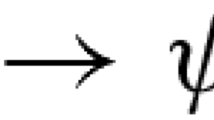Abstract
This paper proposes a logic-oriented framework for the specification and analysis of organizations. Within this framework, an organization is seen as a multi-agent society where each agent has some “capabilities” and where agents interact according to some forms of “institutionalized power relations”. Modal action logics, of the type developed in the Philosophy area, are used to reason about agent's agency and interaction.
In spite of its simplicity (and limitations), the proposed framework allows us to deal, at an appropriate level of abstraction, with some fundamental issues in an organization, like the responsibility for some task, task decomposition, etc. Moreover, it can be used to support the automation of some aspects of the organization's activity and interaction with external users, being already possible to use a workbench to answer questions like “can agent x ensure task A?”, “what should x do to obtain task A?”, and “to whom should a user go (in e.g. a public service) to solve problem A?”.
The workbench uses a tableaux theorem proving method extended with some additional rules to deal with the proposed classical action modalities.
Preview
Unable to display preview. Download preview PDF.
Similar content being viewed by others
References
Skarmeas, N.: Modeling Organizations using Roles and Agents. In: Proc. 5th Hellenic Conference on Informatics, Athens (1995)
Normatics: the characterization of computer systems and complex organizations as normative systems, ESPRIT III BRA proposal (1991)
Jones, A., Sergot, M.: Formal Specification of Security Requirements using the Theory of Normative Positions. In: Proc. European Symposium on Research in Computer Security (ESORICS'92), LNCS 648, Springer (1992) 103–121
Jones, A., Sergot, M.: A formal characterization of Institutionalized Power. Journal of the IGPL (to appear)
Santos, F., Carmo, J.: Indirect Action, Influence and Responsibility. In: Brown M, Carmo J (eds). Deontic Logic, Agency and Normative Systems. Springer, Workshops in Computing Series (1996) 194–215
Harel, D.: Dynamic logic. In: Gabbay D, Guenthner F (eds) Handbook of philosophical logic II. D. Reidel, Dordrecht (1984) 497–604
Meyer, J.-J. Ch.: A Different Approach to Deontic Logic: Deontic Logic Viewed as a Variant of Dynamic Logic. Notre Dame Journal of Formal Logic 29 (1988) 109–136
Chellas, B.: The logical form of imperatives. Perry Lane Press (1969)
Kanger, S.: Law and logic. Theoria 38 (1972)
Pörn, I.: The logic of power. Blackwell, Oxford (1970)
Pörn, I.: Action theory and social science: some formal models. Synthese Library 120, D. Reidel, Dordrecht (1977)
Lindahl, L.: Position and change — a study in law and logic. Synthese Library 112, D. Reidel, Dordrecht (1977)
Belnap, N.: Backwards and forwards in the modal logic of agency. Philosophy and Phenomenological Research 2 (1989) 777–807
Belnap, N., Perloff, M.: In the realm of agents. Annals of Mathematics and Artificial Intelligence 9 (1993) 25–48
Elgesem, D.: Action theory and modal logic. PhD thesis, Dept. of Philosophy, University of Oslo (1993)
Segerberg, K.: Bringing it about. Journal of Philosophical Logic 18(4) (1989) 327–347
Chellas, B.: Modal logic — an introduction. Cambridge University Press (1980)
Hilpinen, R. (ed): Deontic logic: introductory and systematic readings. D. Reidel, Dordrecht (1971)
Hilpinen, R. (ed): New Studies in Deontic Logic. D. Reidel, Dordrecht, 1981
Meyer J-J Ch, Wieringa R (eds). Proc. first international workshop on deontic logic in computer science (DEON'91). Amsterdam (1991)
Jones, A., Sergot, M. (eds): Proc. second international workshop on deontic logic in computer science (DEON'94). Complex 1/94, NRCCL, Oslo (1994)
Brown, M., Carmo, J. (eds): Deontic Logic, Agency and Normative Systems. Springer, Workshops in Computing Series, Sesimbra (1996)
Fitting, M.: First-Order Logic and Automated Theorem Proving. Springer-Verlag (1990)
Tan, Y., Torre, L.: Representing Deontic reasoning in a Diagnostic Framework. In: Proc. Workshop on Legal Applications of Logic Programming (ICLP'94), Genova (1994)
Ramos, P., Fiadeiro, J.: Diagnosis in Organizational Process Design. (submitted for publication)
Author information
Authors and Affiliations
Editor information
Rights and permissions
Copyright information
© 1996 Springer-Verlag Berlin Heidelberg
About this paper
Cite this paper
Santos, F., Carmo, J. (1996). A modal action logic based framework for organization specification and analysis. In: Alferes, J.J., Pereira, L.M., Orlowska, E. (eds) Logics in Artificial Intelligence. JELIA 1996. Lecture Notes in Computer Science, vol 1126. Springer, Berlin, Heidelberg. https://doi.org/10.1007/3-540-61630-6_8
Download citation
DOI: https://doi.org/10.1007/3-540-61630-6_8
Published:
Publisher Name: Springer, Berlin, Heidelberg
Print ISBN: 978-3-540-61630-6
Online ISBN: 978-3-540-70643-4
eBook Packages: Springer Book Archive




